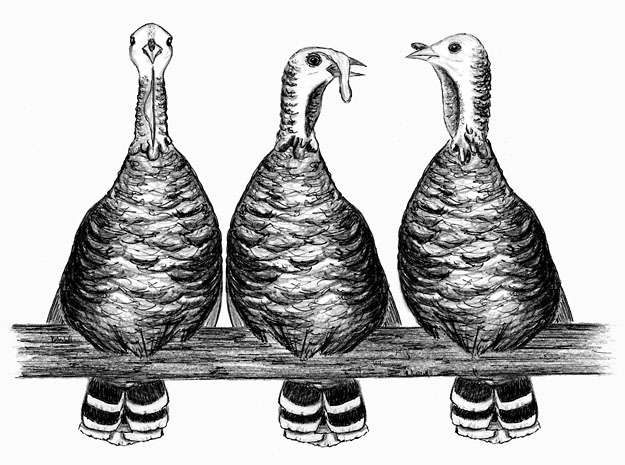
Dear Bird Folks,
While I was making my grocery list, in anticipation of a houseful of company on Thanksgiving, I started wondering what a group of turkeys is called. We have gaggle of geese and covey of quail, but I’ve never heard a name for turkeys. It can’t be simply a flock of turkeys, can it? That sounds too easy. Any thoughts?
– Marie, Ipswich, MA
First about that list, Marie,
I hope that grocery list of yours doesn’t have “buy a turkey” on it. Just buy an extra squash or two and give the turkeys a break. If you won’t do it for me, do it for Benjamin Franklin. Remember, old Ben wanted the Wild Turkey to be our national bird. I think it’s totally un-American to serve our almost-national bird to your annoying relatives. Come on, Marie. Take a stand. I did. The other day a local charity came to see me at work. They wanted a donation so they could buy some less fortunate folks turkeys for Thanksgiving. Turkeys?? To eat? My reply was: “Did you not see the name of this shop before you entered? We like birds here.” After a bit of back and forth (plus, a suggestion to offer free hunks of tofu instead, which surprisingly didn’t go over well), we reached an agreement. I’d buy them all the potatoes they needed, but they’d have to deal with Ben Franklin in their next life. They left happy…and very confused.
A group of turkeys is called a “rafter.” That piece of information came from a book by James Lipton entitled, An Exaltation of Larks. The reason I know of this book is because my birding buddy, Fahy, recently gave me a copy of Lipton’s book. Fahy loves language and finds terms for a collection of things fascinating. But not me; I think it’s a lame excuse to write a book. I mean really, who cares (besides you and Fahy)? Sure, a few of the terms make sense, but most of them, like a “mumuration of starlings,” for example, seem like they were dreamt-up by people who had eaten a batch of bad mushrooms. But as I read the book, I began to realize the reason why many of these terms seem silly to me is because I’m simply not familiar with them. I would be shocked if someone walked in and told me her or she had just seen an “exaltation of larks.” However, I didn’t blink when your question mentioned a “gaggle of geese.” A gaggle? Gaggle is a far stranger word (it reminds me of the faces the charity people made when I suggested tofu). The reason it doesn’t seem odd is because I’m familiar with it.
Most people my age know that a group whales is called a “pod.” We probably imagine a tight group of whales, like peas in a pod. However, younger folks may be confused by the term. Instead of envisioning peas, they are likely to picture an iPod and have no idea what whales have to do with MP3 players. When I read that a group of turkeys is called a “rafter,” it made no sense to me. I pictured turkeys sitting along a beam in a barn. But after reading Lipton’s book I learned that raft means a collection. For example, if you take a collection of logs, tie them together and float them on water, you have built yourself a raft. You know, this language stuff is fun after all. Well, sort of fun.
A group of doves is known as a “dule.” This word also gave me the wrong image. I thought of a duel and imagined doves engaging in some kind of gunfight with Aaron Burr. It turns out that dule comes from the French word “deuil,” meaning “mourning.” A dove has a soft, mournful call (as if it had just lost a duel with Aaron Burr). Teal, which are small ducks, are collectively known as a “spring,” a spring of teal. Want to guess why the term “spring” is used? If you are dopey like me, you imagined a nice spring day when the ice is off the ponds and the ducks have returned from the south. That makes sense but it’s not even close. It turns out that spring has nothing to do with the season. The name comes from the fact that these little ducks can takeoff from the water directly into the air. Many ducks must run along the water’s surface in order to become airborne, but not teal. They spring into the air. (Could this be anymore exciting?) I think most people know that a group of crows is a “murder,” but their cousins, the ravens, also have an unkind name, literally. They are called an “unkindness of ravens.” Years ago, folklore started the rumor that adult ravens pushed their babies out of the nest before they can fly. The rumor is not true and recently the Department of Social Services cleared all adult ravens of any wrongdoing, and yet the name continues.
A group of hawks is a “cast,” because the birds cast off the falconer’s arm. Herons are a “siege,” because they patiently wait out the fish. And the list goes on. There are non-bird terms in the book, too. A group of boys is a “rascal,” and prisoners are called a “pity.” And finally, a group of relatives is known as an “annoyance.” Actually, I’m not sure if an annoyance of relatives is an actual term, but if it isn’t, it should be.